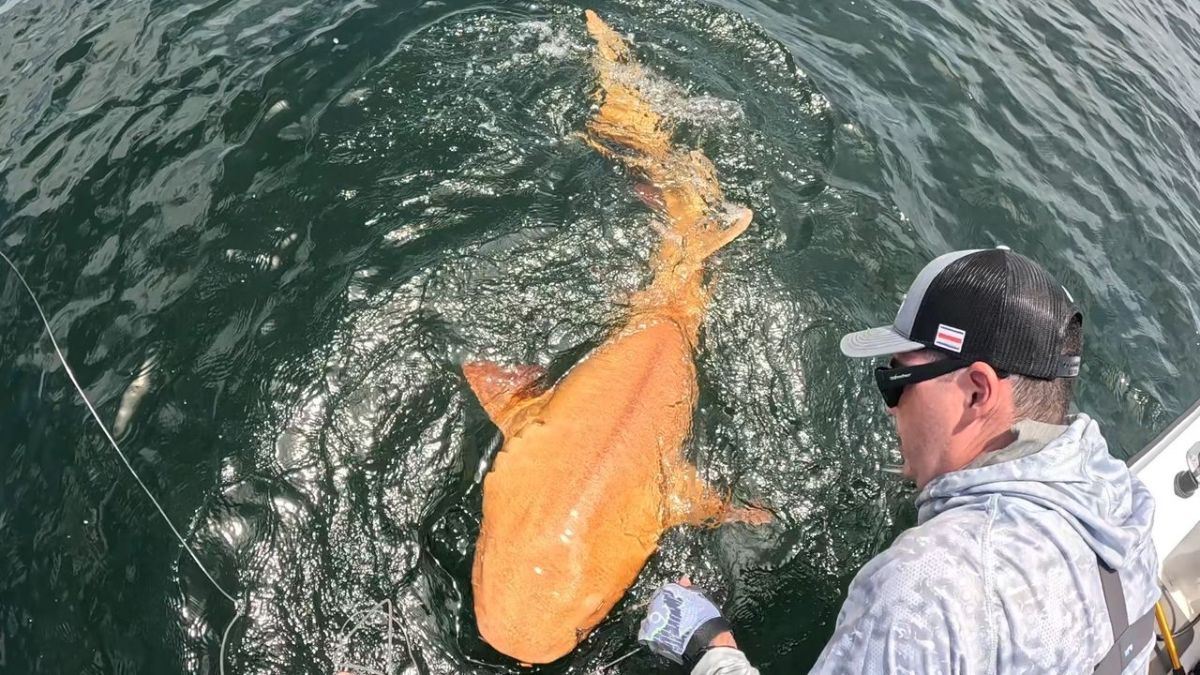An extraordinary nurse shark with glowing orange skin and eerie white eyes has stunned scientists after it was caught and released off the coast of Costa Rica. This rare specimen isn’t just eye-catching—it’s the first documented case of a nurse shark displaying a condition known as xanthism, and possibly albinism at the same time.
Table of Contents
Discovery
In early 2024, sports fishers made the unexpected catch while fishing around 120 feet deep in the Caribbean Sea, near Parismina on Costa Rica’s east coast. Among them was Garvin Watson, owner of the local Parismina Domus Dei hotel. Watson reeled in the 6.6-foot-long shark, instantly recognizing its unusual appearance.
He later shared, “That orange shark shining with the sunlight was something out of the ordinary.” The moment didn’t just leave the fishers in awe—it ended up being a moment of scientific significance.
After photographing the shark, the team gently removed the hook and released it unharmed back into the sea. The encounter was soon analyzed and confirmed by researchers, with their findings published in the journal Marine Biodiversity on August 1, 2025.
Xanthism
Xanthism is a rare condition that causes an abnormal increase in yellow pigments in an animal’s skin, giving it a yellow or orange tint. While it’s been seen before in frogs, birds, and various fish, this is the first scientifically confirmed case in a nurse shark.
Normally, nurse sharks range in color from yellowish to gray-brown, blending easily into sandy or reef environments. But this particular shark was unusually vibrant—almost glowing orange. That stark contrast made it immediately noticeable.
Albinism
Researchers believe the shark might also be albino. Typically, albinism is marked by a lack of melanin, affecting both skin and eyes. In the case of this shark, scientists noted the lack of black irises in the photos, a strong indicator of albinism. Combining albinism with xanthism is extremely rare and was only previously recorded in a ray species in the Irish Sea in 2018.
When both conditions appear in the same animal, it’s called albino-xanthochromism—a mouthful, but a truly fascinating genetic anomaly.
Genetics
So what causes this unusual pigmentation? According to lead researcher Marioxis Macías-Cuyare, a doctoral candidate in Brazil, xanthism is typically genetic. However, environmental factors like temperature, stress, and hormone imbalances may also play a role.
Here’s a quick comparison table of the two conditions:
| Condition | Key Features |
|---|---|
| Xanthism | Increased yellow/orange pigmentation |
| Albinism | Lack of melanin in skin and eyes |
| Albino-Xanthochromism | Combination of both rare traits |
Researchers are continuing their investigation to better understand what caused this unique combination in the shark. Genetic testing and further observation may eventually provide the answers.
Survival
One big question remains: how has this shark managed to survive in the wild with such an attention-grabbing color? In nature, animals evolve specific colors for camouflage and survival. Being bright orange in the ocean should make a shark more vulnerable to predators or less effective as a hunter.
And yet, this nurse shark appears to have reached adulthood without any major issues. According to Macías-Cuyare, this could be due to factors like its environment or behavior, but nothing can be confirmed until more research is done.
So far, this orange shark defies expectations—and science is just beginning to understand why.
FAQs
What is xanthism in animals?
Xanthism is a condition causing increased yellow or orange skin pigment.
Was the orange nurse shark harmed?
No, the shark was photographed and safely released back to the sea.
Is this the first xanthic nurse shark?
Yes, it’s the first confirmed scientific case in this species.
Could the shark be albino too?
Yes, researchers suspect it has both albinism and xanthism.
Why is this discovery important?
It helps scientists understand rare genetic traits in marine life.

















